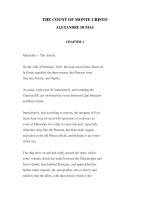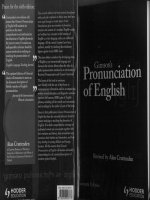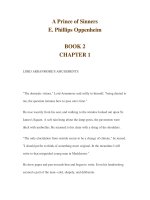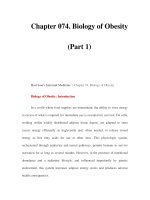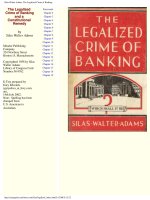Focus of present perfect 1 ppsx
Bạn đang xem bản rút gọn của tài liệu. Xem và tải ngay bản đầy đủ của tài liệu tại đây (196.1 KB, 6 trang )
17 Exercises
1 I have been doing or I have done? (A)
Look at these conversations and put in the correct form of the verb. Use
the present perfect continuous or simple.
►
Sarah: I feel really tired.
Mark: It's because
you've been doing
(you / do) too much.
Sarah: Well, at least
I've finished
(I / finish) that report now, and I can relax.
1
David: Someone
(leave) the ladder outside, look.
Harriet: I expect that's Mike.
(he / clean) the windows. I don't
think
(he/ finish) yet.
2
Laura: You've got mud on your shoes.
Trevor: It's all right, I'll take them off.
(I / work) in the garden.
Laura: Yes, it looks a lot tidier. Well done
(you / do) a good job.
3
Tom:
(I / hear) that you and Harriet are building a garage.
How long
(you / do) that?
Mike: Oh, for about a month now. (we / do)
about half of it.
2 I have been doing or I have done? (A)
What would you ask in these situations? Use the present perfect continuous or simple.
? Your friend is wearing glasses. You've never seen him with glasses on before. Ask him how long
How long have you been wearing glasses ?
? Nick is playing computer games. Ask him how many
How many computer games have you played ?
1 You meet a group of people walking across country. Ask them how many miles
2 Some workmen are digging up the road outside Sarah's house. Ask her how long
3 Laura is taking lots of photos of you and your friends. Ask her how many
4 You have just woken up from an afternoon sleep and seen that it is raining. Ask your friend how long
3 I have been doing or I have done? (A-B)
Complete the conversation. Put the verbs in the present perfect continuous or simple.
Laura: What are you doing, Trevor? (►) You've been (you / be) in here for ages. You're making an awful
mess.
Trevor: (1) (I / clear) out this cupboard most of the afternoon. There's a
lot of old stuff in here. (2) (I / find) these, look.
I aura: (3) (you / sit) there staring at those old boots for the last five
minutes. (4) (I / watch) you.
(5) (you / be) in a dream.
Trevor: They're football boots. (6) (I / have) them since I was about
sixteen. (7) (they / be) in here for years.
Laura: Well, throw them away. And what about that tennis racket? Is that yours?
Trevor: No, it must be yours. (8) (I / never / have) a tennis racket.
18 The past perfect
A Introduction
I felt really tired when I took the train to work
yesterday because Sarah and 1 had been to a party
the evening before. We hadn't gone to bed until after
one. I hadn't been on the train long when I had a bit
of a shock. I suddenly realized that I'd left my wallet
at home. Then I began to wonder. Had I left it in the
office the day before? I just couldn't remember. I
wanted to go back to bed. I felt awful.
The situation is in the past (I took the train I felt
tired ). When we talk about things before this past
time, we use the past perfect.
Sarah and I had been to a party the evening
before.
I'd left my wallet at home.
We are looking back from the situation of the train
journey to the earlier actions - going to a party and
leaving home without the wallet.
Here are some more examples of the past perfect. It was
twenty to six. Most of the shops had just closed.
I went to the box office at lunch-time, but they had already sold all the tickets. By
1960 most of Britain's old colonies had become independent.
As well as actions, we can use the past perfect to talk about states.
I felt better by the summer, but the doctor warned me not to do too much. I'd been very ill. The
news came as no surprise to me. I'd known for some time that the factory was likely to close.
B Form
The past perfect is had + a past participle.
He had enjoyed the party, OR He'd enjoyed the party.
They hadn't gone to bed until late. Where had he put his wallet? For
irregular past participles see page 383.
C Present perfect and past perfect
Compare these examples.
PRESENT PERFECT (before now) PAST PERFECT (before then)
My wallet isn't here. I've left it behind. My wallet wasn't there. I'd left it behind.
The match is over. United have won. The match was over. United had won.
That man looks familiar. I've seen him The man looked familiar. I'd seen him
somewhere before. somewhere before.
19 Review of the past simple, continuous and perfect 20 The past perfect continuous
18 Exercises
1 The past perfect (A)
Read about each situation and then tick the right answer.
► Two men delivered the sofa. I had already paid for it.
Which came first, a) the delivery, or b) V the payment?
1 The waiter brought our drinks. We'd already had our soup.
Which came first, a) the drinks, or b) the soup?
2 I'd seen the film, so I read the book.
Did 1 first a) see the film, or b) read the book?
3 The programme had ended, so I rewound the cassette.
Did I rewind the cassette a) after, or b) before the programme ended?
4 I had an invitation to the party, but I'd arranged a trip to London.
Which came first, a) the invitation, or b) the arrangements for the trip?
2 The past perfect (A-B)
Add a sentence with the past perfect using the notes.
► Claire looked very suntanned when I saw her last week.
She'd just been on holiday, (just / be on holiday)
1 We rushed to the station, but we were too late.
………………………………………………………………………. (the train /just / go)
2 I didn't have an umbrella, but that didn't matter.
(the rain / stop)
3 When I got to the concert hall, they wouldn't let me in.
(forget / my ticket)
4 Someone got the number of the car the raiders used.
(steal / it / a week before)
5 I was really pleased to see Rachel again yesterday.
…………………………………………………………………… (not see / her / for ages)
6 Luckily the flat didn't look too bad when my parents called in.
………………………………………………………………………(just / clean / it)
7 The boss invited me to lunch yesterday, but I had to refuse the invitation.
……………………………………………………………… (already / eat / my sandwiches)
3 Present perfect and past perfect (C)
Put the verbs in the present perfect (have done) or past perfect (had done).
? It isn't raining now. It's stopped (stop) at last.
? We had no car at that time. We'd sold (sell) our old one.
1 The park looked awful. People (leave) litter everywhere.
2 You can have that newspaper. I (finish) with it.
3 There's no more cheese. We (eat) it all, I'm afraid.
4 There was no sign of a taxi, although I (order) one half an hour before.
5 This bill isn't right. They (make) a mistake.
6 I spoke to Melanie at lunch-time. Someone (tell) her the news earlier.
7 I was really tired last night. I (have) a hard day.
8 Don't you want to see this programme? It (start).
9 It'll soon get warm in here. I (turn) the heating on.
10 At last the committee were ready to announce their decision.
They ……………… (make) up their minds.
19 Review of the past simple, continuous and
perfect
A Introduction
Read this true story. It happened some years ago.
A young man walked into a supermarket in Southampton and put a few items of food in a basket. He had
chosen a time when not many people were shopping in the store. He found a checkout where no one else
was waiting. When the cashier had checked the goods, the man gave her a £10 note. When she opened the
till, the man quickly snatched all the money from it and ran out of the store before she realized what was
happening. At the time the security guard was standing at the other end of the store. When staff checked
the records in the till, they found that the thief had taken only £4.37. As he had left the £10 note behind, the
operation had cost him £5.63.
B Comparison of tenses
We use the past simple to talk about the past (see Unit 8).
He snatched the money and ran away. The past simple is used for the actions in
the story, to tell us what happened next.
We use the past continuous (see Unit 9) for something around a past time or a past action.
At the time of the incident, not many people were shopping in the store.
The few customers were in the middle of doing their shopping.
We use the past perfect (see Unit 18) for things before a past situation.
Staff found that the thief had taken only £4.37. The theft of the
money happened before they found out how much.
C Past simple and past continuous
We often use these two forms together when a shorter action comes in the
middle of a longer one (see Unit 10B).
/ was waiting at the checkout when I noticed a strange-looking man.
Seeing the man came in the middle of the wait.
D Past simple and past perfect
When we use these two forms together, we use the past perfect for what happened earlier.
A man walked into a supermarket. He had chosen a quiet time. The
choice of the time came before the arrival in the supermarket.
In this example, one past action followed another.
He filled the basket and went to the checkout. We can also use either
when had done, or after did/had done.
When he had filled the basket, he went to the checkout.
After he had filled (OR After he filled) the basket, he went to the checkout. But when
one short action comes straight after another, we use the past simple for both.
When she opened the till, he snatched all the money out of it.
Note the different meanings.
When I switched the TV on, the programme started. I was just in time.
When I switched the TV on, the programme had started. I missed the beginning. We can use the past
perfect or the past simple with before or until. There is no difference in meaning.
The man arrived at the store before it had opened/before it opened.
The chairman didnt speak until he had heard/until he heard all the arguments.
19 Exercises
1 Past simple, continuous and perfect (A-D)
Look at these sentences and then tick the right answer.
► David and Tom were talking together when a young woman spoke to them.
Which took more time, a) what David and Tom said, or b) what the woman said?
1 Mike had put up the tent, but Harriet was still unloading things from the car.
Which finished first, a) putting up the tent, or b) unloading?
2 Mark went home and switched off the computer.
What did he do first, a) go home, or b) switch off the computer?
3 When Claire arrived, Henry was walking up and down.
Which started earlier, a) Claire's arrival, or b) Henry's walking?
4 When Sarah had phoned the office, she drove to the hotel.
Did she phone the office a) before, or b) after driving to the hotel?
2 Past simple and past perfect (D)
Write the two sentences as one. Use when and the past perfect in either the first or
the second part of the sentence.
► I took the book back to the library. I read it.
/ took the book back to the library when I'd read it.
► The students did the experiment. They wrote a report on it.
When the students had done the experiment, they wrote a report on it.
1 Nick saved enough money. He bought a motor bike.
2 Mark put all the dishes away. He dried them.
3 I looked both ways. I pulled out into the road.
4 The golfers went into the clubhouse. They played the last hole.
3 Past simple, continuous and perfect (A-D)
Daniel is telling the story of how he forgot his passport. Put the verbs into the correct form.
(►) /(
happened
(it / happen) last August at the airport. A few weeks before, a group of us
(1)
……………….
(decide) to go to Greece together for a holiday.
(2)
…………………
(we / wait) in the queue at passport control when suddenly
(3)
……………………
(I / realize) that (4)
(I / forget) my passport.
(5)……………………… (it / be) quite a shock. (6)…………………………………
(I / hurry) to a phone and
(7) ……………………… (ring) my parents. (8)………………………………
(they / work) in the garden,
but luckily my mother (9)
(hear) the phone.
(10)
(they / find) the passport and immediately
(11)………………
(drive) to the airport with it. (12)
…………………
(] / meet) them at
the information desk. (13)
(we / have) no time to talk, but
(14)
………………
(I / say) goodbye to them earlier that morning.
(15)
……………………………
(I / run) all the way to the plane. I was just in time. When
(16)
………………………
(I / get) there, the passengers (17)…………………(sit) in their seats
ready for take-off. When (18)
(they / see) me, everyone
(19)……………………
(start) clapping.
20 The past perfect continuous
A Introduction
David is talking about a situation in the past (Ifell and
broke my leg). When we look back to something before
this past time, we use the past perfect simple (see Unit 18)
or the past perfect continuous.
Past perfect simple: 1 had taken a bus into town.
Past perfect continuous: / had been swimming in the
pool
We use the past perfect continuous for an action which
happened over a period of time. The swimming went on
for some time before David broke his leg.
B Form
The past perfect continuous is had been + an ing-form. /
had been waiting ages, OR I'd been waiting ages. I
had not been paying attention, OR / hadn't been
paying attention. Was the ground wet?
Had it been raining?
C I had been doing or I had done?
Compare the past perfect continuous and simple.
OVER A PERIOD (had been doing)
/ found the calculator. I'd been looking for it
for ages. Vicky felt tired because she'd been
working
all day.
We are thinking of Vicky's work going on as she
got tired.
We normally use the continuous with a phrase
saying how long.
When the company went bankrupt, it had been
losing money for months.
We do not normally use the past perfect
continuous for states (see Unit 7). NOT He
had been-seeming unwell
COMPLETE (had done)
I finally bought a new calculator. I'd looked
everywhere for the old one. Vicky felt
pleased because she'd done so much
work. We are thinking of Vicky's work as
complete.
We normally use the simple form with a phrase
saying how much/many.
When the company went bankrupt, it had lost
over a million pounds.
We also use the past perfect simple for states
(see Unit 7).
The old man had seemed unwell for some time
before he died.
D Comparison with other continuous forms
Compare the present perfect continuous (has/have been doing) and the past perfect continuous.
Vicky looks very upset. I think she's been crying.
Vicky looked very upset. I thought she'd been crying. Compare the past
continuous (was doing) and the past perfect continuous.
When I phoned, Natasha was having a piano lesson. (I phoned during the lesson.)
When I phoned, Natasha had been having a piano lesson. (I phoned after the lesson.)




